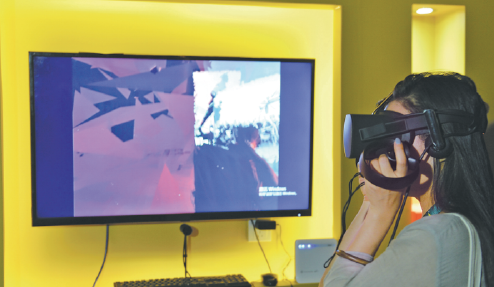High-tech magnifies cinemas' scope
Enhanced viewing experiences may unspool big box-office gains, energize a sluggish market of more than 60,000 screens

For someone who has been waiting for an owl carrying an admission letter to a magic school, here's a chance to experience the wizard idea of the Harry Potter world at a cinema in China.
Farfetched as it may sound, such an experience could soon be reality, given the fast-evolving technologies like virtual reality and 5G that are "coming soon" to a cinema near you, promising to enhance viewing experiences of moviegoers and boost revenues of film exhibitors in a sluggish market.
"An increasing number of cinemas in China are betting on advanced technologies to attract filmgoers, as Chinese audiences today spend more money on tech-embedded film watching experience," said Chen Shaofeng, head of the Fenghuo Cultural Research Center at Peking University.
A film trade report from PwC said tech-embedded auditoria top the priority list of Chinese cinema companies. The latter are struggling with a range of challenges. For one, fewer tickets were sold this year. For another, rapidly developing online streaming services and rising number of home cinemas are offering stiff competition.
China's cinema companies boast over 60,000 screens in all, which generated almost 61 billion yuan ($8.7 billion) in revenue last year. But this year, box-office receipts slumped, sparking concerns as well as moves to reverse the industry's fortunes.
Data from the National Radio and Television Administration showed box-office revenues in the first half of this year were 31.17 billion yuan, down 2.7 percent year-on-year. Total visits to cinemas also fell 10.3 percent year-on-year to 808 million in the same period.
But not so long ago, moviegoers' demand had outstripped supply of cinema screens. However, supportive government policies and subsidies encouraged film exhibitors to expand rapidly. But, an unintended consequence of that frenetic expansion was that supply exceeded demand.
Combined with fewer blockbusters, weakening consumer spending on entertainment due to slowing economic growth, and super-cheap film tickets on mobiles apps becoming rare, overall box-office receipts as well as profits fell.
Take Wanda Film. The cinema company saw its net profit drop by 57.25 percent year-on-year to 829 million yuan for the first three quarters this year. Jinyi Media's net profit was down by 24.17 percent year-on-year to 105 million yuan.
This prompted cinema owners to explore various ways of luring back moviegoers, with focus on high-tech, although almost all film exhibitors are also actively exploring nonbox office revenues.
At the 28th Golden Rooster and Hundred Flowers Film Festival, which closed on Nov 23 in Xiamen, Fujian province, telecom carrier China Mobile's entertainment branch Migu announced cooperation with the film festival. The two decided to launch an innovative service with technologies like 5G, 4K (screening with high-definition images and sound), VR, and AR (augmented reality) embedded in it. The goal is to provide immersive viewing experience to viewers at the festival.
Although there is no full-length film that has used VR technology yet, a few cinemas have adopted the technology to screen short videos, to give a taste of emerging technologies to moviegoers in some first-and second-tier cities.
Chen said further research and development are needed to adopt the technology in cinemas. Aspects like how to avoid dizziness while watching VR content need to be sorted out. As a trend though, VR cinema has the potential to reshape filmgoers' viewing habit, he said.
Details on adapting 5G to cinema operations are still sketchy but many exhibitors have already taken their first step in that direction.
Cinemas are also embracing the latest technologies in conventional projection systems and acoustics, besides investing in upgrades of revolutionary viewing experiences like Imax.
Richard Gelfond, CEO of Imax Corp, Imax China's parent company, said Chinese audiences' demand for Imax experience has never been stronger as it is now, prompting the company to expand its footprint in China.
Imax China reported box-office revenue of $236 million on the Chinese mainland for the first half of this year, up 24 percent year-onyear.
That contrasts with the Chinese mainland's sluggish box-office performance in the same period.
The market-defying success of Imax has encouraged more cinemas to bet on advanced technologies to boost their profits.
Korean cinema chain CJ CGV Co Ltd partnered with Imax China earlier this year to open 40 new Imax screens. Till Sept 30, the Imax screens were installed at 666 cinemas across China.
Since cinemas are all about audiovisual wizardry, film exhibitors are paying equal attention to sound. For instance, US audio technology company Dolby Labs saw steady expansion in China with the growing uptake of the company's imaging and sound technologies.
Dolby partnered with local cinema giants like Wanda Film. By July, ahead of the release of The Lion King, the number of Dolby-fitted cinemas expanded to 51 across the country.
"Dolby cinemas' rapid expansion ... and the ongoing release of new cinema products reinforce the strong demand for spectacular cinema experiences," Doug Darrow, senior vice-president of Dolby's Cinema Business Group, was quoted by a Xinhua report as saying in July.
Chinese cinema chain Wanda Film Holding Co Ltd, which reportedly has about 13-percent market share in China's cinema business, owned or operated 595 cinemas that had in all 5,279 screens by the end of 2018. Wanda has since set up its premium film viewing cinema chain Prime to attract tech-loving, experience-conscious moviegoers.
Huaxia Film Distribution Co Ltd, another Chinese cinema chain, introduced CinemaCon's Cinity Cinema System earlier this year. Oscar-winning director Ang Lee used the system to produce his latest film Gemini Man in 4K stereoscopic 3D at 120 frames per second (which is considered superior to the standard of 24 frames per second).
Domestic firms Guangzhou Jinyi Media Corp, Bona Film Group Ltd and Wanda have agreed to install 20 Cinity Cinema Systems in their cinemas across China.
In addition to high-tech, popular technologies like smartphone apps are boosting box-office receipts in China. Moviegoers find it convenient to pick and choose their seats and book combo deals online in advance at cheaper prices, although such discounts appear to be ebbing of late.
A film industry report from iiMedia Research said online film ticketing now accounts for 85.7 percent of the total film ticketing market. In the first quarter of this year, Maoyan mobile app alone accounted for 42.6 percent of total film tickets sold, while its competitor Taopiaopiao had 31.5 percent.
Now that they have stopped offering deep discounts on film tickets, thus contributing to slack box-office sales, which in turn added to the factors that squeezed profits of cinema firms, film exhibitors can no longer expect to boost profits merely by setting up more cinemas, Chen of Peking University said.
Agreed Neil Wang, president of consulting firm Frost & Sullivan China. He said in the past, whenever cinema companies found demand outstripped supply of screens, their reflex was to simply set up more cinemas. But that strategy would not work in the current market situation. For, as Chen explained, profits and policy support had enabled rapid expansion in the past.
"Now, the market is heading to saturation. Fewer cinemas are betting on filmgoers' habitual visits to boost profit. Instead, they are seeking new revenue growth through technology-embedded film screenings," Wang said, adding such shows can help attract big audiences even if tickets are priced higher.
"Many leading Chinese cinema chains are shifting their focus from box office-led revenue to non-box office-led revenue."
Chen of Peking University said many cinema companies have started seeing derivatives as a new revenue stream, though the sector still lacks a well-developed industry chain. "Intellectual property protection, copyright licensing… these are all challenges that need to be tackled to develop film derivatives into a sector.
"Going forward, there might be more tech innovations for cinemas to better deliver film content. Tech advancement has always been important to boost China's film market."


Today's Top News
- Wang to meet foreign ministers of Cambodia, Thailand in Yunnan
- China's top legislature concludes standing committee session
- Thailand and Cambodia agree to temporary ceasefire
- NPC's 4th annual session slated for early March
- Civilizational links for a fairer world
- Manufacturing in China spurs global growth






























